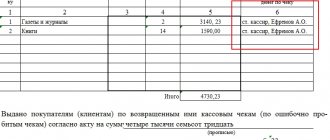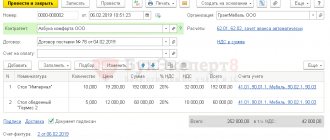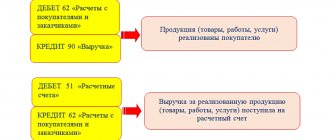In what cases is a collection order issued?
A collection order is a payment document for debiting funds from the payer’s account without his additional consent (indisputably). The Civil Code regulates the procedure for applying collection payments (Articles 874-876 of the Civil Code of the Russian Federation).
Collection orders are submitted to the account:
1) tax authorities and extra-budgetary funds if the deadline for fulfilling the requirement has expired;
2) bailiffs if there is a writ of execution for collection;
3) counterparties of the enterprise or individual entrepreneur, if there is an agreement with the condition of payment in an indisputable manner;
4) a bank conducting settlements for an organization or individual entrepreneur - for counterparties on the basis of their application and a writ of execution issued in connection with a court decision.
In any case, the use of a collection order is based on the recipient’s right to collect a certain amount of money from the payer (clause 7.4 of the “Regulations on the rules for the transfer of funds” No. 383-P, approved by the Bank of Russia on June 19, 2012).
Difference from other payment documents
Let's look at how a collection order differs from other types of payment documents.
The payment order for the transfer of funds is filled out and presented to the bank for execution by the payer himself on a voluntary basis.
The payment request is made by the payee, but its presentation does not mean execution by the bank - the consent (acceptance) of the payer is often required to make the payment. If the payer disagrees, such a document will be returned to the recipient without execution. In certain cases, direct debiting of a payment request is also possible (by a court decision, on the grounds provided by law), incl. if the parties to the contract have agreed on this.
The procedure for working with a payment order in a bank
In case of partial payment, all copies of the payment order must contain the bank stamp, date and signature of the bank employee in the “Bank Marks” details. The first copy of the payment order is endorsed by the bank employee controlling it. Placement o is made on the front side in the upper right corner. On the reverse side of the payment order, the balance amount, the amount of the partial payment, the serial number of the partial payment, the date of the payment order and the signature of the responsible bank executive are indicated.
When making the first payment, the first copy of the payment order is placed in the bank’s daily documents, and the last copy is an attachment to the extract from the payer’s personal account. After the last partial payment has been made under a payment order, the first copy of the payment order for which this payment was made, together with the first copy of the paid payment order, is placed in the documents of the day. The remaining copies of the payment order are transferred to the payer along with the last copy of the payment order attached to the personal account statement.
Mandatory details of a collection order
Today, the established form of collection order 0401071 is used (Appendix No. 4 to Regulation No. 383-P). In addition to the general requirements for all payment documents for non-cash payments (date, number, amount, name of the payer and his TIN, KPP, bank details - bank name, BIC and bank correspondent account, recipient and his TIN, KPP, bank details), There are additional requirements for collection:
- In the purpose of payment:
If collection is issued on the basis of an agreement, indicate its number, the clause on the indisputable write-off procedure, as well as the name of the goods, works, services for which payment is made.
- When a collection order is issued on the basis of the law (for example, when tax authorities collect a fine), the name of the collection, the date, number and article of the federal law justifying the collection, the number and date of the decision on collection are indicated.
- The document based on the writ of execution indicates: the authority that issued the document, the date of the writ of execution, the number of the court case or materials.
The bank checks both the form itself and the applications. Execution of a collection order is carried out only if all formal requirements for the document are fulfilled. If they are not observed, the executing bank notifies the originator so that they can eliminate the shortcomings. If the collector has not corrected the shortcomings, the bank returns the collection order without execution (clause 1 of Article 875 of the Civil Code of the Russian Federation; clause 3 of Appendix 13 of the Regulations of the Bank of Russia “On the payment system of the Bank of Russia” dated 07/06/2017 No. 595-P).
Payment of the company's debt by third parties
There is another possible course of action - payment of tax by another person. Moreover, it does not matter from whom the payment comes (from an individual or a legal entity). The main thing is that the purpose of the payment must indicate: “payment of tax... for (period) for Romashka LLC TIN/KPP...”.
Despite the fact that the payer will be another person, the Federal Tax Service will determine the payment based on the information specified in the “Purpose of payment” field.
If the taxpayer-debtor decides to take this option, then immediately after the payment has been made, contact the tax service and notify that the payment of the tax or fee was made by another person (name of the enterprise or last name, first name and patronymic, who made the payment, TIN and checkpoint if available). You can also send a payment order to the Federal Tax Service to confirm payment.
Russian legislation has made it possible to pay taxes and fees for third parties from the end of 2021
, when Part 1 of Article 45 of the Tax Code of Russia was changed. Payment can be made through the special service “Payment of taxes for third parties” on the Federal Tax Service website.
If the tax payment was made by third parties, you should pay attention to documentary evidence of this transaction. If this is gratuitous assistance from the owner, then an appropriate agreement must be drawn up. If the parent organization or an interdependent person paid, then the payment of tax must be reflected in the reporting in accordance with the rules of PBU. Otherwise, a number of questions may arise
from the Federal Tax Service specialists.
Collection orders from tax authorities
Most often, companies and individual entrepreneurs are faced with collection orders from tax authorities. In case of untimely payment of taxes and financial sanctions (fines, fines), the Federal Tax Service issues a demand to the debtor for payment, indicating the amount and date - by what date it must be fulfilled. If the taxpayer did not pay on time or did not challenge the legality of the claim (clause 3 of Article 46 of the Tax Code):
- no later than 2 months after the end of the period allotted for payment, a decision is made to recover funds;
- If more than 2 months have passed since the date specified in the request, a decision on collection can no longer be made, but the inspection has the right to go to court within six months.
Collection orders from tax authorities are usually received by the bank within 24 hours from the moment the decision on collection is made, and the amounts of money are written off without dispute. The Federal Tax Service must notify the taxpayer of the decision to collect payments within 6 days.
In addition to the collection order, tax officials usually send to the bank a decision to suspend transactions on the account for the same amount. In addition, in the presence of such restrictions, banks do not have the right to open a new current account for a taxpayer. Even if payment is made immediately, lifting the suspension may take a while.
Read also: Letter to the tax office about unblocking an account: sample
If there are insufficient funds in the account, the Federal Tax Service (and extra-budgetary funds) sends the bailiffs a decision to collect the amount due from the debtor’s property (Article of the Tax Code of the Russian Federation). Failure to comply with the bailiff's order within 5 days also entails the collection of an enforcement fee - 7% of the collection, but not less than 1,000 rubles from an individual entrepreneur and not less than 10,000 rubles from an organization (Article 112 of Law No. 229-FZ “On Enforcement Proceedings” dated 02.10 .2007).
Free legal consultation: For any questions
Submission to the authorities.
Tracking. Control of every movement of the case. There is always a possibility that the client does not need to go to court or draw up a claim and other documents, since there is no prospect of winning and the client will waste time and money, or worse, worsen his situation.
This is why our company’s lawyers first do a free analysis of the situation, study the available documents, and only after that offer solutions, if any. Why do they trust us? Quality of service For more than 10 years, our company has been providing free legal advice in various areas of civil law. Speed Professionals in their field will advise you within 5 minutes.
And you will know everything about solving your situation. Knowledge Each client's case is transferred to the appropriate legal department, where it is analyzed by at least 3 specialists, including a senior lawyer.
Confidentiality In accordance with the Federal Law of the Russian Federation of July 27, 2006 N 152 “On Personal Data”, we guarantee complete confidentiality of all consultations. Savings Thanks to our extensive experience in the field of civil law, we can confidently say what to do in various situations.
Minimum actions for maximum results. Ease When contacting us, clients forget about their problem. Entrust your care to us, professionals in our field.
Get a free consultation right now! Moscow St. Petersburg By clicking the SEND button, you accept the terms Send Send Our lawyers and attorneys will help you “Every problem can be solved through the means of the law.
Settlements by collection orders between counterparties
There are two types of collection according to calculations:
- clean collection – a bill or check is presented for payment;
- documentary collection – to make payment, transaction documents are required: agreement, delivery note (act), invoice, etc.
An agreement may be concluded between suppliers (executors) and buyers (customers), providing for the right of the supplier to receive funds from the buyer’s current account without his consent under certain conditions (for example, completion of the delivery of goods). A copy of the agreement is transferred to the servicing financial institution. When submitting supporting documents, the recipient's bank verifies the legality of the claim and, if everything is in order, transfers the collection order and documents to the payer's bank. The payer is notified about the transfer of funds, and the recipient is notified about their crediting.
Virt laser
In this case, the period for acceptance must be at least five working days.
We recommend reading: Preliminary purchase and sale agreement from a notary, price Rostov-on-Don
When registering a payment request, the creditor (recipient of funds) under the main agreement in the “Term for acceptance” field indicates the number of days established by the agreement for accepting the payment request. In the absence of such an indication, the period for acceptance is considered to be five working days.
On all copies of payment requests accepted by the executing bank, the responsible executor of the bank in the field “Final. acceptance period" indicates the date upon which the period for acceptance of the payment request expires.
When calculating the date, working days are taken into account.
The day the bank receives the payment request is not included in the calculation of the specified date.
The last copy of the payment request is used to notify the payer of the receipt of the payment request. The specified copy of the payment document is transferred to the payer for acceptance no later than the next business day from the date of receipt of the payment request by the bank.
The transfer of payment requests to the payer is carried out by the executing bank in the manner prescribed by the bank account agreement.
Payment requests are placed by the executing bank in the file cabinet of settlement documents awaiting acceptance for payment until the payer's acceptance is received, the acceptance is refused (full or partial), or the acceptance period expires. The payer, within the period established for acceptance, submits to the bank the appropriate document on the acceptance of the payment request or refusal in whole or in part from its acceptance on the grounds provided for in the main agreement, including in the event of a discrepancy between the applied payment form and the concluded agreement, with a mandatory reference to clause, number, date of the contract and indicating the reasons for refusal.








